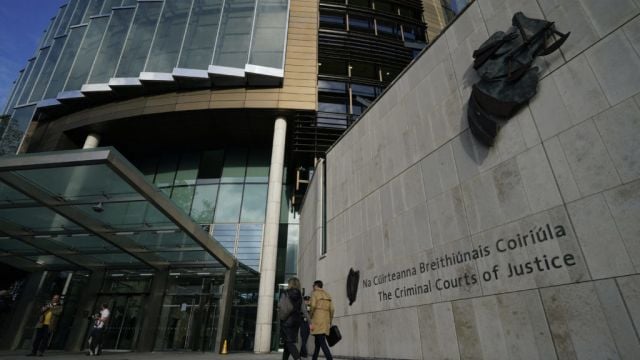A man who admits killing but denies murdering his neighbour with a machete told a psychiatrist that he is an innocent man, adding: "I did not kill anyone, I am Moses, a prophet of God."
Consultant psychiatrist Dr Mary Davoren on Friday told the trial of Patrick McDonagh that in her view the accused was not suffering from a mental disorder, that he is an unreliable historian and may have exaggerated or feigned memory loss about the incident.
Dr Davoren told prosecution counsel Philipp Rahn SC that if there was any abnormality in Mr McDonagh's mental state at the time of the alleged offence, it would most likely be accounted for by cannabis use.
Dr Davoren's view differed from that given by Professor Patricia Casey, who was called by Mr McDonagh's defence.
Professor Casey told the trial that the accused's responsibility for the killing was significantly reduced because he was suffering acute symptoms of schizophrenia.
Patrick McDonagh (52), with an address at Whitechapel Road, Clonsilla, Dublin 15, is charged with murdering his next-door neighbour Peter McDonald (73) on Whitechapel Road on July 25th, 2020. He has pleaded not guilty to murder but guilty to manslaughter.
The State has not accepted his plea and he is on trial at the Central Criminal Court.
Dr Davoren told Mr Rahn: "In my opinion he [Mr McDonagh] was not suffering a mental disorder at the time of the alleged offence and drug misuse was the primary issue at the time."
Dr Davoren told Mr Rahn that she interviewed the accused four times following the death of Mr McDonald.
When asked to give an account of what happened, he told her: "I'm an innocent man, I don't know what happened, I was in the house when the police came to the door." He said he was trying to pray when gardai knocked on the door before breaking in and shooting him with a Taser.
Dr Davoren said he appeared to be unhappy that she was asking questions about what happened to Mr McDonald, said he wanted to go to hospital and told her: "I wouldn't do anything like that, there's no violence in me. I have never threatened any person in my life."
He also told her that he was taking cannabis daily in the weeks and months leading up to the alleged offence, although she noted that he gave three different accounts of his drug use.
Illicit drugs
In one interview he told Dr Davoren he could not remember if he was smoking cannabis at that time and later again said that he had not been taking cannabis, alcohol or any other illicit or prescribed drugs.
She said Mr McDonagh had a pattern of minimising his drug use during his interviews with her.
Under cross-examination, Dr Davoren told John Fitzgerald SC that she did not believe Mr McDonagh's unreliability was down to confusion.
When Mr Fitzgerald asked if she was saying that Mr McDonagh lied, she said that is for the jury to decide. She added: "In my view he was unreliable but not confused."
Dr Davoren said there was clear evidence that Mr McDonagh had a long history of substance misuse including the consumption of cannabis and benzodiazepines.
She noted that four days after the alleged offence he refused urinary drug screening. In the absence of drug screening, she said a diagnosis of schizophrenia cannot be relied on.
She said Mr McDonagh presented with mental health difficulties in the context of dependence on and misuse of illicit drugs. She said there were further concerns regarding "cognitive malingering" that arose from tests carried out by a clinical forensic psychologist.
Dr Davoren said Mr McDonagh also reported unusual and bizarre symptoms to her, such as that he had seen and heard a bull outside his room at night, that he was seeing coloured dots, talking shadows, visions of talking heads on the walls and of "our lord" speaking to him.
She said these were "very unusual experiences and very atypical for schizophrenia. They're not the type of symptoms people experience during schizophrenia.
"She noted that Mr McDonagh had not reported to staff that he had seen and heard a bull outside his room. "If you believed there was a bull outside your room it is very unlikely you would not report it or that staff would not document it, because it is very unusual," she said.
She said the symptoms Mr McDonagh described were "so bizarre that if they were actually going on it would be clearly observed in his speech, demeanour and thought processes that this was a very unwell man. What I was observing of him was out of keeping with what was being described to me."
She said that he did not look as if he was responding to hallucinations and his behaviour was not in keeping with a person experiencing those types of symptoms.
Professor Casey was recalled by the defence. She told Mr Fitzgerald that illusions such as the visions of the bull at night are common and even occur in people with no mental illness. They are not indicative of psychopathology, she said.
Professor Casey said research shows that people with chronic psychosis don't always respond to hallucinations because they have been "dealing with them so long they have gotten used to them... most in-patients are not sitting around talking to themselves or boxing things they think they can see."
The trial continues next Tuesday before Mr Justice Michael MacGrath and a jury of nine men and three women.







